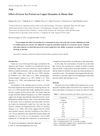 10 citations,
November 2014 in “Journal of Dermatological Treatment”
10 citations,
November 2014 in “Journal of Dermatological Treatment” Polyphenols may help treat skin conditions like warts, hair loss, acne, and dark spots, but more research is needed.
 9 citations,
November 2022 in “Applied sciences”
9 citations,
November 2022 in “Applied sciences” Marine algae compounds may improve skin health and promote hair growth.
 39 citations,
June 2017 in “Journal of Applied Research on Medicinal and Aromatic Plants”
39 citations,
June 2017 in “Journal of Applied Research on Medicinal and Aromatic Plants” Plant-based ingredients are effective and safe for modern skincare products.
 September 2023 in “International journal of drug delivery technology”
September 2023 in “International journal of drug delivery technology” The herbal shampoo effectively cleans and controls fungal growth.
 170 citations,
September 2019 in “Evidence-based Complementary and Alternative Medicine”
170 citations,
September 2019 in “Evidence-based Complementary and Alternative Medicine” Some medicinal plants can help heal wounds and may lead to new treatments.
 December 2013 in “Biomedical and biopharmaceutical research”
December 2013 in “Biomedical and biopharmaceutical research” Nanotechnology shows promise for better drug delivery and cancer treatment.

Plant-based compounds can improve wound dressings and skin medication delivery.
 11 citations,
February 2021 in “Trends in Food Science and Technology”
11 citations,
February 2021 in “Trends in Food Science and Technology” Impatiens plants have health-promoting compounds and are used for natural food coloring, but more research is needed to understand their full benefits.

New treatments for hair loss should target eight main causes and use specific plant compounds and peptides for better results.
 16 citations,
September 2018 in “Journal of Ethnopharmacology”
16 citations,
September 2018 in “Journal of Ethnopharmacology” Plant-based remedies may treat hair loss by reducing inflammation and improving insulin resistance.
 1 citations,
September 2022 in “Molecules”
1 citations,
September 2022 in “Molecules” Fructus Malvae may help with diabetes, tumors, and hair loss due to its various active compounds.
 5 citations,
January 2022 in “Molecular Medicine Reports”
5 citations,
January 2022 in “Molecular Medicine Reports” Pine bark extract helps mice grow hair by reducing inflammation and boosting growth factors.
 7 citations,
March 2021 in “Evidence-based Complementary and Alternative Medicine”
7 citations,
March 2021 in “Evidence-based Complementary and Alternative Medicine” Nelumbinis Semen extract helps hair grow and could prevent hair loss.
May 2024 in “Molecules/Molecules online/Molecules annual” Plant extracts can help prevent hair loss and promote hair growth.
 30 citations,
February 2018 in “Journal of Pharmacy and Pharmacology”
30 citations,
February 2018 in “Journal of Pharmacy and Pharmacology” Hedychium spicatum has medicinal properties but needs more research for scientific validation and use.
 45 citations,
January 2020 in “International Journal of Molecular Sciences”
45 citations,
January 2020 in “International Journal of Molecular Sciences” Some natural compounds may help overcome drug resistance in certain cancers, but more research is needed.
 7 citations,
March 2023 in “Antioxidants”
7 citations,
March 2023 in “Antioxidants” Rosemary may help treat various skin conditions due to its antioxidant and anti-inflammatory properties.
 67 citations,
June 2018 in “Engineering in Life Sciences”
67 citations,
June 2018 in “Engineering in Life Sciences” Plant cell culture is a promising method for creating sustainable and high-quality cosmetic ingredients.
 86 citations,
June 2017 in “Anais Brasileiros de Dermatologia”
86 citations,
June 2017 in “Anais Brasileiros de Dermatologia” Antioxidants can benefit skin health but should be used carefully to avoid negative effects.
 December 2022 in “Frontiers in Pharmacology”
December 2022 in “Frontiers in Pharmacology” Tianma Gouteng decoction may help prevent hair loss and promote hair growth.
 December 2024 in “Antioxidants”
December 2024 in “Antioxidants” Luteolin can reduce hair graying in mice, with external treatment being more effective.
1 citations,
May 2024 in “Pharmaceutics” Hemp is a promising ingredient for skin products due to its healing and soothing properties.
 12 citations,
December 2012 in “Current Drug Targets”
12 citations,
December 2012 in “Current Drug Targets” The Androgen Receptor could be a target for treating diseases like cancer, but more research is needed to confirm the effectiveness of potential treatments.

Arabica coffee pulp extract may help prevent hair loss and promote hair growth.
 6 citations,
October 2016 in “Food Science and Biotechnology”
6 citations,
October 2016 in “Food Science and Biotechnology” The water extract of Bituminaria bituminosa, high in phenolic compounds, shows strong antioxidant and enzyme inhibitory potential.
 January 2013 in “Food science and technology research”
January 2013 in “Food science and technology research” Green tea extract may increase copper levels in mouse hair without affecting liver copper.
December 2024 in “International Journal of Scientific Reports” The plant-based hair serum is a promising and safe alternative to minoxidil for hair regrowth.
1 citations,
October 2023 in “Animals” A small dose of Platycladus orientalis leaf extract improves raccoon dogs' growth and health, but higher doses can be harmful.
2 citations,
April 2021 in “Asian pacific Journal of Tropical Biomedicine” Origanum vulgare leaf extract reduces liver and kidney damage caused by finasteride in mice.
 July 2024 in “Science and Culture”
July 2024 in “Science and Culture” Thuja orientalis L. has many health benefits and could be used in new medicines.

























